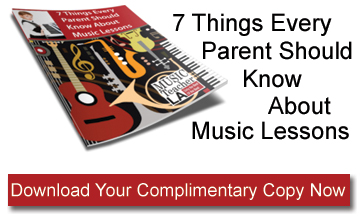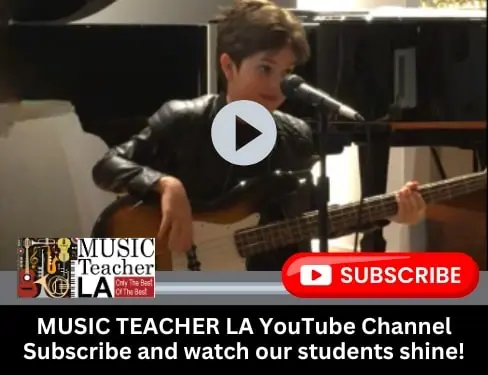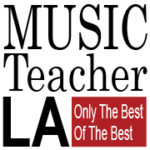FAQs about Quality Private Music Lessons
What is the best age for children to start taking private music lessons?
Our FAQ page is designed for parents and students to find the answers about private music lessons.
Whether your child takes a music appreciation class or starts lessons, they’ll benefit from being exposed to music. Kids can start formal music training as early as age 4 when brain circuits for learning music mature. In fact, studies at the University of California suggest that taking music lessons at age 4 can increase your child’s brainpower.
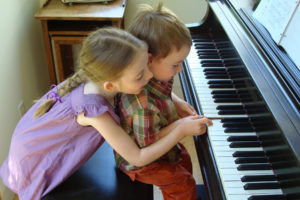 Generally speaking, the recommended time to begin private one-on-one music lessons is from age four to five. More specifically, 4 1/2 years for piano, 5 years for violin, and 4 years for voice (Basic voice training- songs, posture, pronunciation, and breathing – no serious voice training until the age of 13 to avoid damaging the vocal cords). However, since every child is unique in his development and abilities, it is important to pay attention to both their emotional, mental and physical readiness before engaging them in a lesson program. Your readiness and support are also important.
Generally speaking, the recommended time to begin private one-on-one music lessons is from age four to five. More specifically, 4 1/2 years for piano, 5 years for violin, and 4 years for voice (Basic voice training- songs, posture, pronunciation, and breathing – no serious voice training until the age of 13 to avoid damaging the vocal cords). However, since every child is unique in his development and abilities, it is important to pay attention to both their emotional, mental and physical readiness before engaging them in a lesson program. Your readiness and support are also important.
Emotional readiness:
Emotional maturity is necessary because learning to play an instrument requires patience, concentration and repetition. The student should be able to sit still and focus for at least 20 minutes. It is best if your child has indicated some desire to learn to play an instrument. If the interest is generated by the parent, younger students have been known to lose interest more quickly than if they expressed the desire to try the instrument themselves.
Mental readiness:
All music is made up of notes and every note has a letter name. In order to properly grasp the concepts of music, younger children will need to be able to read and comprehend the alphabet.
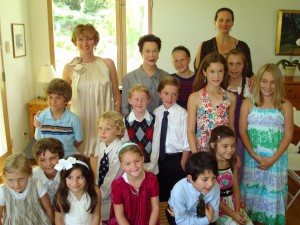
In addition to understanding the alphabet, counting numbers is a concept that students will also need to understand. Counting is necessary to learn the concept of rhythm and beat. Understanding the difference between different numbers will help them to understand the difference between different note values and rhythmic patterns.
The student should be able to process more than one concept at a time. Learning to read written music is a fairly sophisticated process. A student will be learning to read the notes, figure out the rhythm, and translate that to the finger movements. Focus is an integral part of learning any instrument, as is being able to listen and follow directions that the teacher gives and complete the tasks given.
Physical readiness:
Young children will need to have fine motor skills, such as the ability to use small muscles, specifically their hands and fingers to play piano effectively and learn the proper techniques. The student should also have some basic hand-eye coordination, meaning they are able to coordinate the information received through the eyes to control and direct the hands.
Parental readiness:
Parental support and willingness to help the child out is an important element. Parents who are willing to spend time working with their children to develop a daily practice routine will help them to excel faster and keep the child motivated to continue learning the instrument.
What is the best instrument to start on?
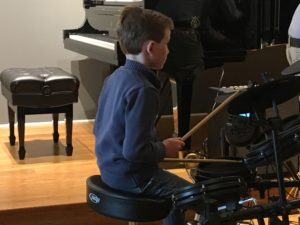
#1. Piano (music theory, basic concept applicable later to other instruments)
#2. Voice (Fun!)
#3. Drums (Fun, great for highly energetic kids)
#4. Violin (Suzuki method designed for children as young as 3)
At these ages, however, the most important thing is that your child enjoys their lessons. All of our instructors work well with young children and keep the classes fun and fast-paced.
Will the teacher provide the instrument?
Our teachers do not provide instruments, so students must have their own ready before the first music lesson. This is essential not only for practicing at home but also because we assign homework that requires a personal instrument. For piano or keyboard lessons, students should have a keyboard with weighted keys at home, and for in-home lessons, a keyboard or piano is necessary.
Adult students taking singing lessons at home will need a keyboard for the lesson, though it doesn’t need to be elaborate. The teacher will use it to play pitches during the lesson.
For violin, guitar, and drum lessons, students must have instruments fitted to their size. Violins and guitars, like shoes, come in various sizes to ensure a good fit.
You can visit our Student Library page for information on the appropriate violin size and recommendations for instruments and materials.
Am I too old to begin private music lessons?
No! The wonderful thing is no one is ever too old to start learning to play an instrument!
What will I learn in your music lessons?
We make your musical goals our number one priority in our music lessons. For example, if your goals are to learn to play your favorite rock songs, we will not force you to learn from a classical method book. We are here to help YOU achieve your goals!
We are experts at teaching beginner music lessons, but we also have world-class teachers who are capable of coaching you to a very high level. Some of the skills we can teach you are: Music Reading. Music Theory. Proper Instrumental Technique. Performance Skills. How to Practice effectively. etc…
What genres of music do you teach?
We teach all styles and genres from Rock, Jazz and Blues to Classical and Country music.
Let us know what you want to learn, and we’ll make it happen!
Are Music Teacher LA instructors qualified professionals?
We have about 40 highly qualified professional music teachers with college degrees in music and extensive teaching experience. In addition to their expertise and teaching credentials, our teachers have warm and friendly personalities, and they are committed to sharing their wealth of knowledge and love of music with students of all ages and ability levels. Lastly, we tailor lessons to meet individual needs and tastes. >>Read more about our TEACHERS
We will make your musical goal a reality!
It’s easy to get started!
Call or Text Now: (310) 220-0405 or REQUEST INFO


